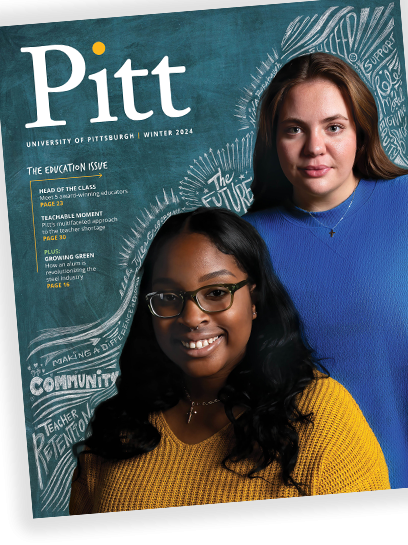
As a business major at University of Pittsburgh at Johnstown in 1983, Andy Rhodes was required to take a computer programming class. The idea was to give him and his classmates a taste of how their future selves might use technology to make their jobs more efficient.
The class changed his life.
“It just lit me up,” Rhodes says.
At the time, UPJ did not have a robust data science major, so Rhodes transferred to the Pittsburgh campus where he enrolled in what was then called the information sciences major. Rhodes was fascinated with how computers could change the way the world processed and used data. It was a new concept for a boy from Greensburg, Pennsylvania, who was the first in his family to go beyond the second year of college.
Along with his studies, Rhodes (SCI ’87) was an accidental cheerleader. When a friend went to cheerleading tryouts, Rhodes decided to tag along. To his surprise, he made the squad.
“I got to be around sports and represent the University at the highest levels,” he says. “It was a great experience.”
Unfortunately, Rhodes’ limited finances did not allow him to enrich his studies with clubs, study abroad or travel to conferences.
“My parents sacrificed every penny to make it possible for my sister and me to go to school,” Rhodes says. “We also took jobs to pay the bills; however, the extra things were out of reach for us.”
Right out of college, Rhodes landed a job with a Washington, D.C.-based consulting firm and worked alongside Bill Inmon, who is considered the father of data warehousing, which involves collecting data from a wide range of sources into a single database for use in a variety of projects.
“It was a relatively easy transition from college to the workforce, thanks to my Pitt education,” Rhodes says. “The information sciences program was all about this type of technology, which was just taking off at that point.”
The consulting work took him around the world building systems. It was exciting, but he wanted a leadership role and to have a staff. So, when Mattel, the toy and entertainment company, reached out to him to take a leadership role in their IT department, he jumped at the chance.
As his skills grew, Rhodes explored options outside of Mattel, including leading the technology division as chief information officer for the United States Golf Association and its 25 million members and 19 national tournaments. Then he got a job offer he couldn’t refuse. The United Nations International Children's Emergency Fund (UNICEF) wanted him to run its technology operations.
“That really tugged on my heartstrings,” Rhodes says. “My wife, Karen, and I love to travel and had seen UNICEF tents and schools and much of the organization’s good work around the world.”
While he was head of technology for UNICEF, Rhodes and his team used data in new ways to find people in the United States who might be interested in supporting UNICEF’s work but perhaps had not heard of the organization.
“Then we used other data to find where the needs were the greatest and where we could deliver the most value to ensure every child had a chance to thrive,” Rhodes says. “It was an incredible experience to apply the concepts of computational data that I learned at Pitt to such important, life-saving work.”
Rhodes eventually left UNICEF for his current position at another service-oriented organization — Ultimate Medical Academy, a nonprofit health care education institute offering certificate and associate degree programs that helps mostly lower-income students transition to work in health fields.
Rhodes’ service orientation goes beyond his career; he also leads his life with that focus. Rhodes is the chair of the University of Pittsburgh School of Computing and Information Board of Visitors, and he often meets with students interested in working for a nonprofit or non-governmental agency. He and his wife also have created an endowed student resource fund at the University, drawing on Rhodes’ own experience as a struggling college student.
“I imagine the funds supporting a student like me — someone who has put everything into their education but does not have the resources to access the things that enrich the experience, such as attending a conference,” Rhodes says. “We named it the Rhodes Family Resource Fund because it represents the sacrifices my parents made to allow me to have the education and the life I have had.”
Rhodes encourages others to honor their Pitt experience through giving.
“Find a theme that is personally interesting or satisfying to you and then understand how that interest can translate into a student’s journey; that is where the magic happens,” Rhodes says. “Pitt opened the aperture of what was possible for me, and we can make sure others have the same opportunities.”



